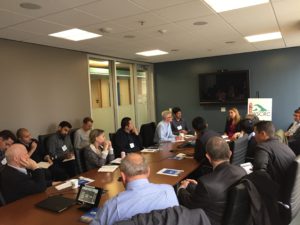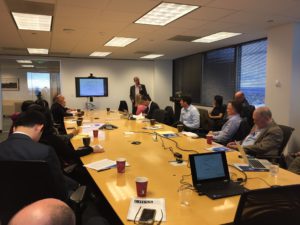
On October 24, 2018, the Washington State China Relations Council held a session of the Policy Briefing Series titled “US-China Trade War: Impact on WA State” featuring speaker Lori Otto Punke, President of the Washington Council on International Trade (WCIT). The WSCRC Policy Briefing Series provides a venue to speakers who are experts in their respective China-related fields to interact directly with WSCRC’s membership through timely, focused discussions. The series engages leading subject-matter experts from government, industry, law, and technology communities to provide in-depth insights on current key issues in US-China-WA relations.
Lori leads advocacy efforts to increase Washington’s international competitiveness and oversees the management and growth of WCIT. She is also the founder and principal of LOP Strategies, where she helps clients ranging from Fortune 500 companies to small businesses and associations on public affairs, policy and communication. Speaking about the recent NAFTA renegotiation, Lori detailed the revamped dispute mechanism and its implications for domestic laws, as well as international trade obligations. She initiated a comparative conversation on the renegotiated NAFTA and selected provisions of the Trans-Pacific Partnership (TPP).
Lori elaborated upon the progression of the US-China trade dispute. Citing the rationale of the Trump administration, the speakers described the intention as to punish China for past trade transgressions like stealing intellectual property to encourage Chinese companies and government entities to follow norms established by the WTO and other related organizations. As Lori noted, “the devil is in the details” when it comes to managing tariffs and retaliatory measures.
The lively Q&A session involved the experts in the audience, such as Robert Hamilton, Governor’s Advisor for Trade Policy for the State of Washington, and Glen Bachman, Commission President of the Port of Everett. Following an overview of the impacts of tariffs on Washington State’s agricultural sector, the conversation touched upon how American farmers are bracing for possible trade retaliation from China for Trump’s tariffs on steel and aluminum. China imports more than half of annual US soybean exports, which are shipped through Washington State ports. If China cuts back further on US agricultural products during current trade tensions, Commissioner Bachman noted it would take a considerable amount of time and effort to reverse the damage.
WSCRC extends thanks WSCRC Government Affairs Committee member Spencer Cohen for serving as a discussion moderator.
Summary Author: Mengyao Liu
